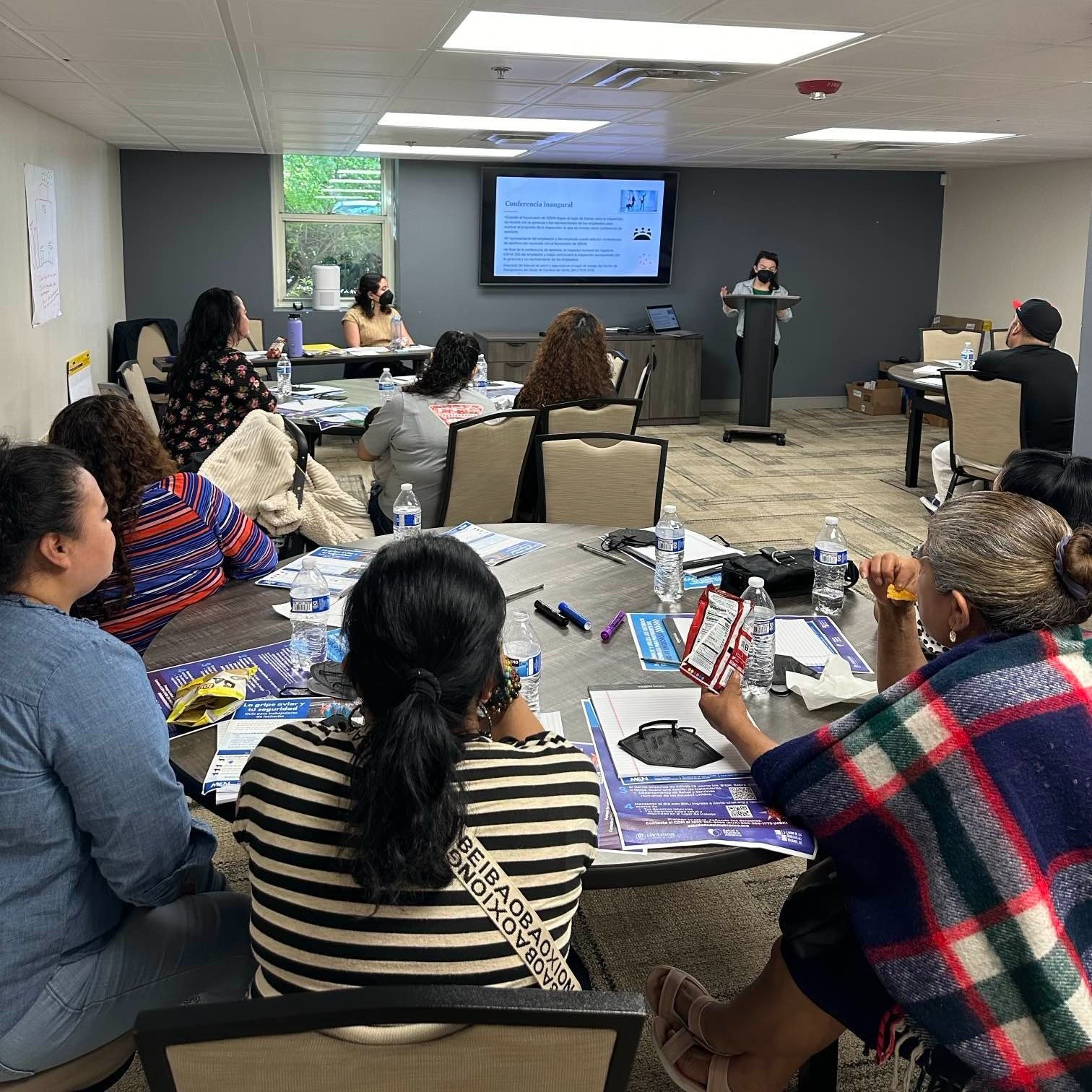OSHA Training for Georgia Poultry Workers and Immigrant and Worker Rights Organizers
With funding from the Susan Harwood Training Grant Program, Sur Legal Collaborative continues to arm poultry workers and labor organizers with knowledge around common risks and hazards across the industry and their rights, especially in relation to the Occupational Safety and Health Act.
In the almost four years since our founding, Sur Legal has worked strategically to engage poultry processing workers, particularly those who survived the deadly and preventable nitrogen leak in Gainesville, Georgia. Over the past year, we have developed a training curriculum informed by the unique needs of workers within this notoriously low-paying, high-hazard industry. Our team has delivered trainings for workers and worker rights organizers across the state—from Gainesville to Savannah—partnering with grassroots organizations including the Economic Justice Coalition (EJC), a Black worker center in Athens, Georgia, and Migrant Equity Southeast (MESE), an immigrant rights organization in Savannah, Georgia.
Training in Savannah with our partners, Migrant Equity Southeast (MESE).
Topics covered during the training included an overview of the most common hazards in the poultry industry, what OSHA is and what the agency does, best practices for filing an OSHA complaint to ensure an in-person OSHA inspection, and means of protecting workers from immigration based retaliation.
Top Poultry Industry Hazards:
Our trainings engaged workers and organizers in participatory exercises including body mapping and hazard mapping. During these exercises, participants circled areas of the body on an illustration, highlighting where they have experienced or could be at risk of experiencing injury or illness. One of the participants during the Gainesville training shared that she was exposed to excessive levels of flour while coating pieces of raw chicken. The flour was covering her eyes and she was inhaling the particles. The employer failed to provide her with adequate personal protective equipment (PPE), including eye protection and a respirator, to protect her from these excessive levels of flour. Another poultry worker shared that while working a third sanitation shift cleaning equipment in the poultry facility, he got bleach in his eyes because he was not given proper eye protection. His eyes became highly irritated and he did not have immediate access to an eye washing station, a violation of OSHA requirements. Both of these workers left with more information about their rights and how to prevent injuries like the ones they endured from occurring in the future.
Training for poultry workers in Gainesville, Georgia.
Similarly, worker rights organizers with MESE shared their own lived experiences as children of immigrants and/or immigrants themselves being exposed to difficult and hazardous working conditions in jobs like farm work, where they were exposed to dangers like wasp nests and snakes while working in the fields. Together, our organizations talked about how to educate and empower vulnerable worker communities in South Georgia with the tools and knowledge they need to fight against these conditions, and ways that MESE’s organizers can support these workers on labor complaints to OSHA.
The development and delivery of our training in Gainesville was supported and informed by our Worker Advisory Committee (WAC). Formed earlier this year, our WAC is made up of seven immigrant workers who were previously supported by Sur Legal on labor complaints and applications for immigration relief. We asked these seven individuals to join our WAC because of their demonstrated leadership and bravery, filing labor complaints against abusive employers in the aftermath of the 2021 nitrogen leak as well as coming forward about sexual harassment in the workplace at a grocery store in Macon, Georgia. The Gainesville-based members of the WAC were critical in helping recruit participants for our May 2024 training for poultry workers. They also led the body and hazard mapping exercises and shared about their personal experiences and challenges in the workplace.
One of our WAC members shared: “I liked the training that was held in May a lot because it helped give us a guide on what to do at work if something is wrong, and it helped remind us that we do have rights and responsibilities no matter the immigration status a worker has. It also affirmed that we workers are a valued and integral part of the workplace, and that gives us a sense of peace and courage to continue onward.”
In addition to our WAC, the success of our trainings this summer would not have been possible with the support of our incredible partners, including the EJC, MESE, and the Georgia Coalition for the Peoples' Agenda, and generous hosts including the Unitarian Universalist Fellowship of Athens who shared their space with us!
MESE organizer, Luisa Nolasco, shared: "The OSHA training provided by Sur Legal to our team was empowering and eye-opening. As organizers, we aim to always be equipped to better serve our community and being able to be trained on this issue is imperative for the work that we do at MESE. I feel equipped to provide the immigrant workforce with the rights they have under the OSH Act."
Together, we’ve reached 29 workers and organizers with these trainings so far, and we look forward to continuing to expand our efforts. We’re continuing this training series further into the Deep South, partnering withDignidad Inmigrante en Athens (DIA) for a Spanish language train-the-trainer workshop later this fall!
***
Sharing knowledge and putting legal tools in the hands of the people is at the core of everything we do here at Sur Legal Collaborative. If you’re interested in learning more about our work, our availability for training and speaking opportunities, and our Know Your Rights initiatives, please don’t hesitate to reach out to us at info@surlegal.org.




